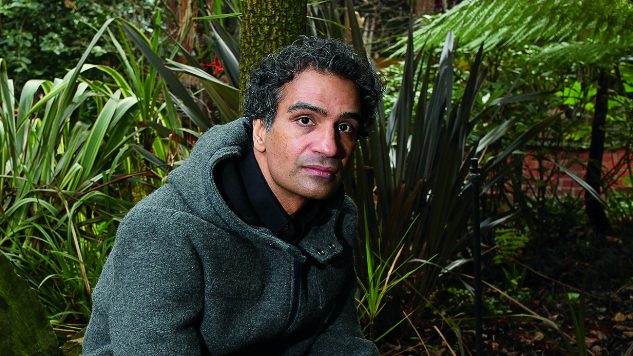What Kind of God: Violence, Religion and Magic Collide in Nadeem Aslam’s The Golden Legend
Author photo by Eamonn McCabe
I just finished watching the perfect movie. Only it wasn’t a movie; it was a book.
When you love a work of literature, you may abhor the thought of an adaptation. But Nadeem Aslam’s The Golden Legend is so cinematically tantalizing that it seems ready-made for the screen.
Set in Pakistan, the novel follows several characters whose lives are uprooted when an American man, under the protection of his government, kills innocent Muslims. After this attack, a Muslim widow and her Christian lover are publicly exposed in a community where people have been legally murdered for far less. At the center of everything is a Christian woman who’s been pretending to be a Muslim her entire adult life. When her husband dies, having never learned the truth, she’s consumed with grief and guilt. And the unique circumstances surrounding his death catapult the woman’s entire neighborhood—comprised of both Muslims and Christians—into chaos.
The Golden Legend insists on a very simple but terrifying fact: everything is political. God, love, family, justice, faith, power, friendship, secrets—acts of kindness and acts of evil are all informed by politics. Perhaps there is an exception to the rule: attraction. But everything else falls under the sword of political forces—particularly as they relate to religious orders—and their deadly policies.
 From the first of many deaths in the book, The Golden Legend is a powerful reminder that, far too often, our lives and deaths are not determined by our gods…or our selves. Imperialism and terrorism determine the losses suffered by our heroes. Grief too, is complicated by policy, such as when a wife must grieve her husband while also being threatened by men who control a country under the guise of submission to Allah. Their true motivations, however, are not the message of the Prophet, peace be upon him, but power itself—power that might even be granted to them by the Western world they claim to despise.
From the first of many deaths in the book, The Golden Legend is a powerful reminder that, far too often, our lives and deaths are not determined by our gods…or our selves. Imperialism and terrorism determine the losses suffered by our heroes. Grief too, is complicated by policy, such as when a wife must grieve her husband while also being threatened by men who control a country under the guise of submission to Allah. Their true motivations, however, are not the message of the Prophet, peace be upon him, but power itself—power that might even be granted to them by the Western world they claim to despise.
The relationship between politics and religion leads to casualties, and children are some of the greatest victims. The novel introduces a child who has been taught that a Christian’s blood runs black. And so he attempts to cut open another child to find out. After all, isn’t it what his God would want him to do? In addition to presenting violent acts with a sober hand, Aslam writes characters who make it easy to understand how one might become radicalized in a country that both supports such movements and offers little else in the form of “justice.”
If a man is, for example, tortured by Indian police officers who are responsible for his mother’s disappearance, he might very well join an army of Muslim men who promise justice. The Golden Legend presents us with such a character, one who becomes disillusioned when he realizes that this army has no single enemy. Watching such a character then develop into an unlikely hero and love interest is part of the story’s magic.
But the novel also possesses very real magic, which presents itself in various forms. Falling in love is, of course, one type of magic. And Aslam concerns himself with the magic of creation and creativity; the written word is itself a character, as a single book—and each character’s physical and emotional relationship to it—weaves through the narrative. Over time, the book, titled That They Might Know Each Other, becomes the Golden Legend and represents a father’s legacy and a surviving wife’s redemption.
This fictional book is more than just symbolic, as its text examines the relationships between countries, leaders, nations, religions and the works of art they’ve inspired (“Many features in Ibn-ul-Arabi’s description of Hell, Paradise, and the Beatific vision,” Helen read out from a triangular piece of the book’s page 653, “are to be found in Dante’s The Divine Comedy.”). The Golden Legend is a reflection of the beloved book in its story—a work that dares to explore the entire world. It highlights how we are defined by arbitrary boundaries, especially when their very existence calls for the torturing of children, for the rape of women, for the poverty of one group over another.
But let’s return to the magic for a moment. In one of The Golden Legend’s most memorable scenes, one of our heroes shares a memory of his mother hiding treasure from the Indian police officers, who would later go on to torture her sons—and inspire them towards radicalization.
As she was returning from the kitchen with the water jug, Imran found an emerald among the vegetables on his plate, the sound of astonishment escaping his mouth… Just then his brother discovered a ruby on his plate. Within the next few minutes there were two more rubies, a small diamond, a sapphire and three emeralds on the edges of their plates—on the rims where they would ordinarily put the bones of a fish or pits from the fruit during a meal.
-

-

-

-

-

-

-

-

-

-

-

-

-

-

-

-

-

-

-

-

-

-

-

-

-

-

-

-

-

-

-

-

-

-

-

-

-

-

-

-








































